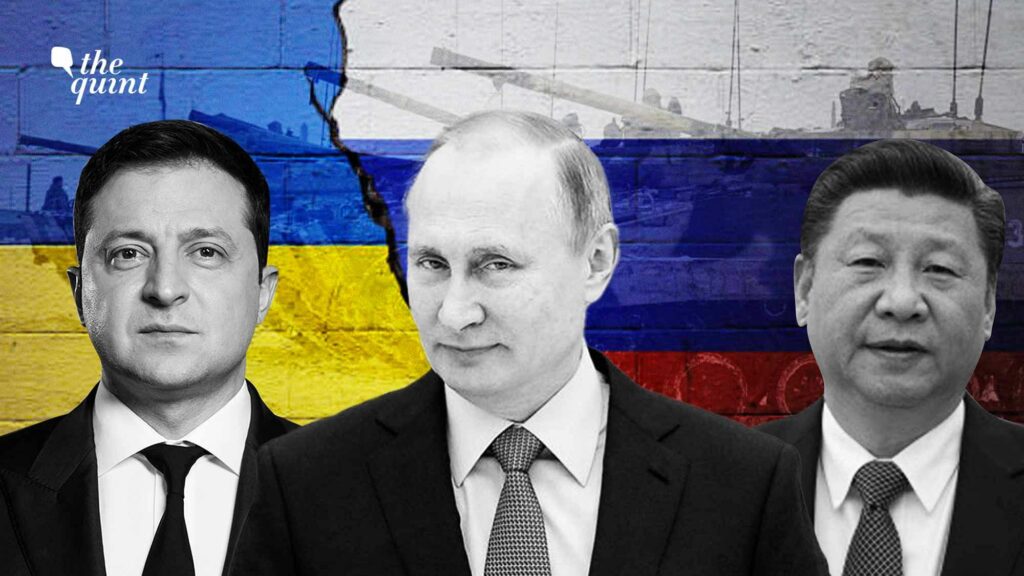Manas Dasgupta
NEW DELHI, March 2: After one of its nationals was injured in Russian shelling in Kharkiv on Wednesday, China said it was “extremely concerned” about the harm to civilians in Ukraine, the Chinese Foreign Minister Wang Yi told his Ukrainian counterpart in a call.
It gives an indication of Beijing’s desire to prevent the war’s further escalation and that China was no longer ready to accept all the harms its close political friend Russia might inflict on Ukraine, particularly in the face of strong reaction and economic sanctions from the United States and the Western World.
“As the war continues to expand, the top priority is to ease the situation to prevent the conflict from escalating or even getting out of control, especially to prevent harm to civilians, and to ensure the safe and timely access of humanitarian aid,” the Chinese foreign minister said.
Wang said the world’s second largest economy also “deplores the outbreak of conflict between Ukraine and Russia,” according to a statement posted on the Ministry of Foreign Affairs website. The remarks were published after a call between Wang and Ukrainian Foreign Minister Dmytro Kuleba, the most senior exchange since Russia’s Vladimir Putin launched the invasion last week.
Wang also acknowledged the conflict was a “war,” rather than a “special military operation” as described by Russia. Kuleba said Ukraine was willing to strengthen communication with China and that it looked forward to China’s “mediation for the realization of the ceasefire,” according to the statement.
“This is a very important event and signals the very high attention that the Chinese government is paying to the Ukraine crisis,” said Henry Wang Huiyao, founder of the Center for China & Globalization policy research group in Beijing. “If both Ukraine and Russia invite China to be a mediator, then China would probably join.”
The war is testing Chinese President Xi Jinping’s commitment last month to a “no limits” relationship with Putin, as the U.S. and its allies pile on sanctions and press Beijing to take a stand against military aggression. In recent days, Xi has urged Putin to pursue negotiations and China’s United Nations ambassador abstained from, rather than opposing, a Security Council resolution condemning the attack.
The call between Wang Yi and Kuleba came as convoys of Russian military vehicles bore down on the Ukrainian capital of Kyiv and other major cities, prompting warnings that Moscow could unleash a mass bombardment on populated centres.
Still, China has refrained from publicly calling for a ceasefire or describing the war as an “invasion,” and thus a violation of the UN-guaranteed sovereignty Beijing frequently vows to uphold. China hasn’t criticized Russia, and continues to voice support its security concerns and blame the U.S. for precipitating the crisis.
China boasts deep economic ties with Ukraine, and Wang Yi expressed concern over the safety of Chinese citizens there, estimated at 6,000 when the invasion began. Beijing’s support is seen as essential to Moscow’s efforts to weather international sanctions, which are cutting if off from huge swaths of the world’s trade, finance and travel.
Some 2,500 Chinese nationals have been relocated from Ukraine as of midday Wednesday, Foreign Ministry spokesman Wang Wenbin said at a regular press briefing in Beijing. He sidestepped a question on whether Xi would speak with Ukrainian President Volodymyr Zelensky, saying only that Beijing’s communication links with Kyiv were open.
During the call, Wang Yi said China always upholds respect for sovereignty and territorial integrity of all countries, and called on Ukraine and Russia to “find a solution to the issue through negotiations,” according to the statement. China supports all constructive international effort conducive to “political settlement,” he added.
Russia apparently has been stunned for the opposition its forces are receiving even in the areas bordering with Russia and populated mostly by the Russian-speaking people. Russian President Vladimir Putin might have expected to receive welcome to his mission to rid Ukraine of what he describes as its “fascist” regime, but was greeted with people flying the Ukrainian flag and chanting in Russian “Go home! Go home!”
“Russian soldiers have occupied our town. They thought people are going to be happy to see them, smile and welcome, but we are not,” some Russia-born and Russian-speaking people migrated to Ukraine said. “We don’t need Putin’s ‘help’.”
The reception in Berdyansk and in neighboring Mariupol, two predominantly Russophone cities that have benefited from Russian trade and tourists, captures how the invasion of Ukraine appears to have galvanized the nation of 41 million people rather than divide it further.
Those who do welcome the Russian forces may still be unwilling to show it, given the continuing conflict and heated passions. Yet so far there has been little, if any, sign of support in the towns Russian forces have taken, which carries long-term implications for Putin’s plan to install a friendly government to run Ukraine as a quiescent satellite.
Mariupol, a city of over 500,000 people, meanwhile was under heavy artillery fire and aerial bombardment. Its Russian-speaking mayor, Vadym Boychenko, was looked on with suspicion by pro-Ukrainian activists before last week. On Tuesday, he was on Ukrainian television describing the attacking force as “Russian Nazis,” accusing them of deliberately targeting infrastructure and shelling residential areas. Russia has said it does not target civilians.
The soldiers filmed in front of Berdyansk’s town hall didn’t react to the people chanting at them on Monday and have not been shooting at civilians. Ukrainians differ from Russians regardless of what their first language may be, because they won’t be silent and don’t like to be controlled.

